Wednesday, August 13, 2008
Polistra's dream, 6
Part 6 of Polistra's Dream.
Read Part 1 and Part 2 and Part 3 and Part 4 and Part 5 first.
Ponca, July 1939. Arcade Hotel.
Fran and Polistra are getting ready for an evening in the hotel's club.

Fran: Quit fidgeting, silly.
Pol: I'm not fidgeting.
Fran: Yes you are.
Pol: Am not.
Fran: Listen hon, you came back to this decade to soak up some civilization, so you shouldn't fight it. Ladies should dress like ladies, and men should dress like men. Maintaining standards of dress and behavior is a big part of civilization. You know that, but you're forgetting it.
Pol: Right. I'm sorry.
Fran: That's better. Not long now ... just need to take in this seam a bit more.

Pol: Mighty handy, having a club right here in the hotel.
Fran: Yeah, but I rarely use it. Not much fun sitting alone, and it's often reserved by the oilmen and such. I'd rather listen to the radio in the evening.
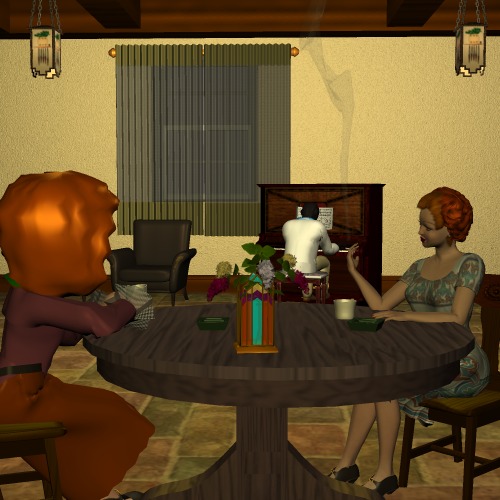
Fran: The club is Mr Wentz's own design. He had an artist build those lamps based on the Osage tribe's battle shield.
Pol: Excellent art, and excellent piano playing.
Fran: That's Nicodemus Carr. He's here every weekday evening, playing colored spirituals and such.
Pol: Steal away to Jesus, isn't it?
Fran: Composed here in Oklahoma. Bet you didn't know that.
Pol: I thought it was a lot older?
Fran: Ah, but Oklahoma is a lot older than most people think. Steal Away was written -- rather composed -- around 1840 by Uncle Wallace Willis, a colored slave owned by a Choctaw cotton farmer near Doakstown. He also wrote Swing Low and a few others. Apparently a reverend at the Choctaw mission heard him singing these songs, wrote them down and sent them to a music school in New York that was collecting spirituals. It's possible that the songs had an earlier origin, but they hadn't been heard or written down anywhere else so Uncle Wallace Willis got the credit.
Pol: Those spirituals are still around in my time, but they don't get heard much on radio or TV. The black churches
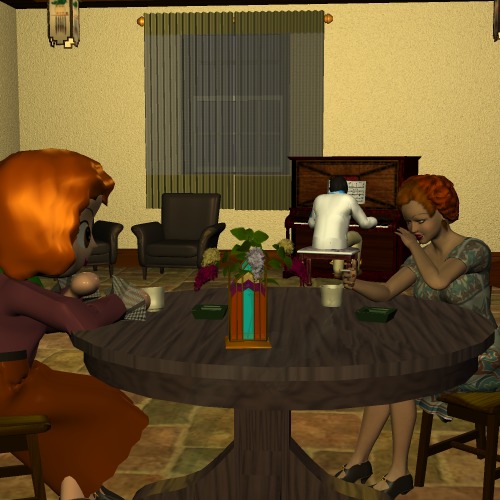
Fran: Colored churches. 'Black' is impolite.
Pol: Oops. The colored churches still sing them with plenty of gusto, but the effort to mix them into a truly American form of classical music is long gone.
Fran: So Dvorak's work, Scott Joplin's work, Aaron Copland's work, Gershwin's work, Paul Whiteman's work, all for naught?
Pol: Yup. Some of those pieces are performed by stiff tuxedo-style classical orchestras, and rich audiences listen dutifully, but there's no new composition at all, and no fun allowed, no improvising. It's sort of fossilized.
Fran: I need a drink.
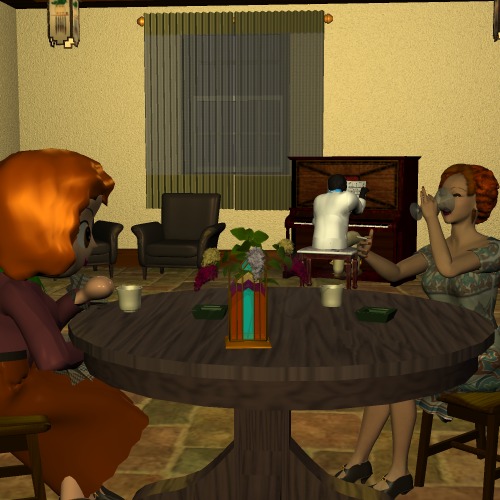
Pol: Better now?
Fran: Sort of.

Pol: Oddly enough, the Romantic tradition moved to the Orient. Chinese and Korean composers are writing new music that sounds like Copland with a local flavor.
Fran: How about popular music? It's always changing.
Pol: Yes, but even pop music has frozen up some in the last decade or two. You expect pop music to change fast enough that youngsters can always shock their parents, but it really hasn't changed much from 1988 to 2008. The kids listen to the very latest band, but they also listen to music from twenty years earlier without considering it hopelessly square, because it's not all that different.
Pop is basically divided into two categories: Rock and Rap. Rock is mainly favored by white youngsters. It's ultimately derived from swing, but you couldn't tell that by listening. Imagine putting a microphone inside the engine compartment of a Model T without a muffler, out of oil, running uphill in low gear on a hot day with the radiator boiling over. Toss a dozen cats inside the engine compartment where they can get caught in the fan belt and scorched on the manifold and shocked by the magneto, then amplify the whole mess up to a volume that will shake the plaster off a wall. Play this inside an apartment, or through a car radio at full volume. That's rock.
Fran: And the other?
Pol: Rap is mainly favored by bla- I mean colored youngsters. It's much quieter than rock, and oddly enough more old-fashioned in its sound. Not too far from the vaudeville tradition, where the instruments are playing a tune but the singer mainly recites.
Fran: Sprachgesang.
Pol: Bless you.
Fran: No, Wagner called it that. Sprachgesang means speak-singing. But you emphasized in its sound?
Pol: Yes. The words are a long long way from Gilbert & Sullivan or Fibber & Molly. The words are mainly cussing of the worst kind, and between the cuss words they are ordering the listener to do all sorts of criminal things. Kill policemen, rape women, kill politicians, you name it.
Fran: I shouldn't have asked. What accounts for all this freezing, do you think?
Pol: I think it's a case of too much variety. When you turn on the radio, you have, what, four networks available on the broadcast band?
Fran: Yeah, plus local stations often have live music by local performers, and locally done drama programs and poetry.
Pol: Okay. If you stick with CBS, for example, you can hear news, live classical music, live popular music, scholarly discussions, drama, comedy, advice, without ever changing the frequency. Right?
Fran: Right. And the same sort of variety on the other networks.
Pol: And when you pick up a newspaper, you can read solid news, look at serious art, serious poetry, along with gossip on the ladies' page. Right?
Fran: Right. They want to please as many of their customers as possible.
Pol: That's the key. In my time we have another broken circle, but this one isn't broken by using slave labor in foreign countries; it's broken by a huge variety of radio and TV and other outlets. If you don't want to hear classical music, you can avoid it entirely. If you don't want to read poetry, you can easily find a paper that will never sully your eyes with good verse, will give you only poorly written articles about celebrities.
Fran: But that sounds like a good thing.
Pol: Yes, it does in theory. But it turned out bad. In the '30s a good painter or writer can seek a mass audience. He can try to make pictures or novels that will be understood by most literate people. And if he does, he'll be paid reasonably well.
Fran: Norman Rockwell. Edgar Guest.
Pol: Yes. Or a good orchestra can be heard on CBS, and make good money from the performance. This has two effects: exposes the audience, especially the youngsters, to good material; and compels the poet or orchestra to turn out works with broad appeal if they expect to make a living. In the 2000's, because everyone can find exactly their own preferred "diet" of art, music and writing, there's no pull toward universality. The artist and his loyal audience become inbred; he creates only for the folks who already like his kind of stuff. This freezes him into ever-increasing specialization. He knows there's no money in the universal, no point in trying something different; he has to keep doing more and more of what his fans want.
Fran: I'll confess I've wished for a specialized radio station at times. Guess I'll stop wishing!
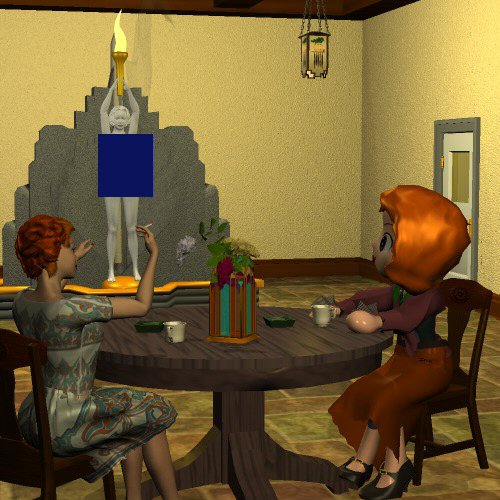
Fran: And now, ladies and gentlemen ... at the other end of the tent, behold the Goddess of Oil!
Pol: Oh! Magnificent. Utterly lovely, and another good mixture of classical and modern.
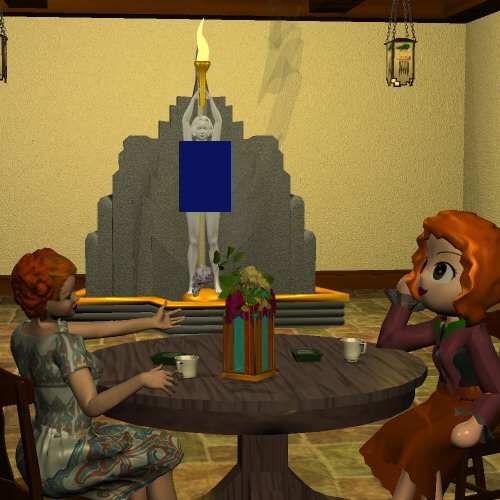
Fran: Well?
Pol: Okay, so I'm predictable. In 2008, real paintings and sculptures are appreciated by some, but no longer created by anyone. Because of the loss of common connection, the loss of the public square, artists have gone off in weird directions and the people who pay for art don't know to ask for anything better. So the result, as I mentioned the other day, is a cruel joke. And I mean that literally. Artists and sculptors get paid millions to create public statuary, and they work hard, stretch their imagination as far as it will go, to viciously mock the people who pay the bill, to rub the people's faces in nastiness.
Fran: For example?
Pol: Since this is a cartoon, I can show you instead of telling you. Watch:
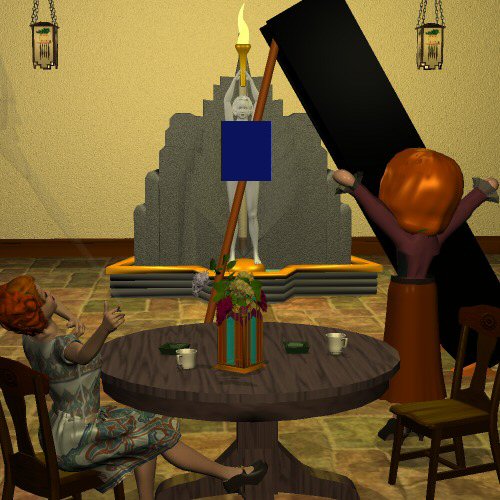
Fran: What in the name of heaven? An elephant trap? Railroad trestle on a crutch?
Pol: You're not supposed to ask what it represents. This was a very expensive public sculpture built in Kansas, commissioned by the university. The real thing was ten times this size, large enough to crush a bungalow. It was placed in a residential area in Lawrence where
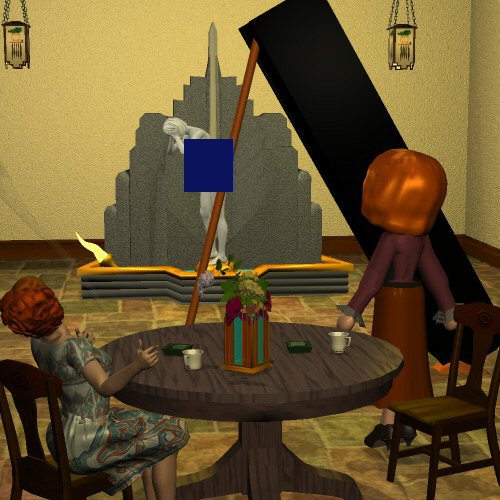
Goddess: Aaaaggghh! I can't stand it!
Pol: Oh dear. I'm terribly sorry.
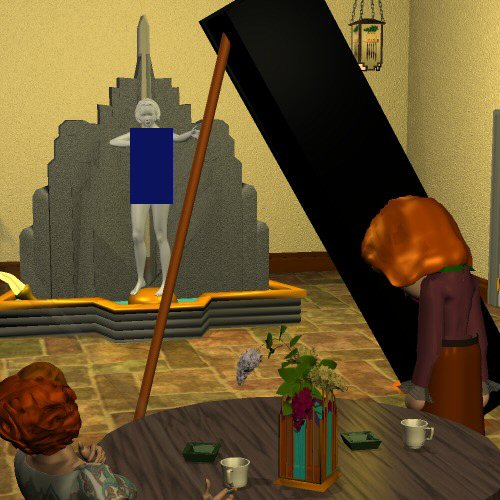
Goddess: I may not know much about art, but I know what I am. I'm art, and this thing isn't art.
Pol: I'll take it away.
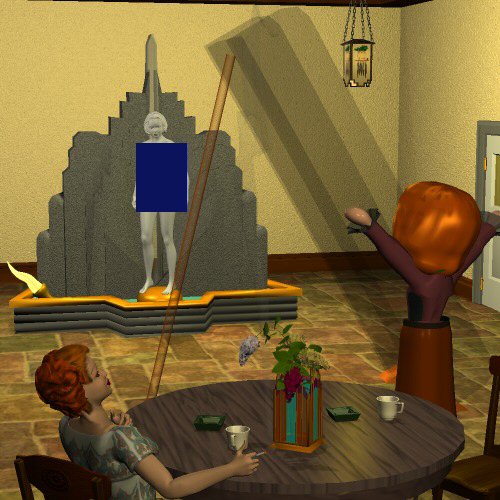
Goddess: Much better.
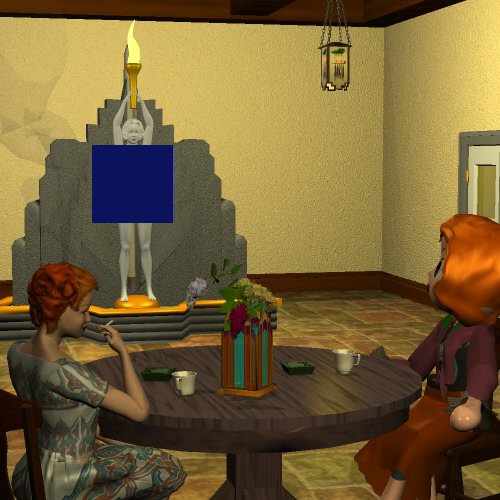
Goddess: Thank you. Remember, civilization is a delicate thing.
Pol: Yes. Those modern artists know it. That's exactly why they break it. Brutal art is an explicit part of the Communist plan to weaken civilization.
Continued in Part 7 here.
= = = = = = = = = = = = = = = = = = = = = = = =
Footnote 1:
The Goddess of Oil. She was not really built in Ponca in '39. She was planned in Tulsa in 1941. A small model was made, but Pearl Harbor intervened before a full-size statue could be built. An effort is now underway to build the statue, led by the grandson of the woman who posed for the original "prototype". I discussed this in detail a month ago.
Footnote 2: I had originally written a salute to Prof Lysle Mason as a second footnote. Later decided to separate it out because it deserves its own link. Here's the tribute to Mason. Footnote 3: (Feb 2015) I've self-censored the 'artistic nude' to avoid Blogspot's new idiot censorship.
Read Part 1 and Part 2 and Part 3 and Part 4 and Part 5 first.
Ponca, July 1939. Arcade Hotel.
Fran and Polistra are getting ready for an evening in the hotel's club.

Fran: Quit fidgeting, silly.
Pol: I'm not fidgeting.
Fran: Yes you are.
Pol: Am not.
Fran: Listen hon, you came back to this decade to soak up some civilization, so you shouldn't fight it. Ladies should dress like ladies, and men should dress like men. Maintaining standards of dress and behavior is a big part of civilization. You know that, but you're forgetting it.
Pol: Right. I'm sorry.
Fran: That's better. Not long now ... just need to take in this seam a bit more.

Pol: Mighty handy, having a club right here in the hotel.
Fran: Yeah, but I rarely use it. Not much fun sitting alone, and it's often reserved by the oilmen and such. I'd rather listen to the radio in the evening.

Fran: The club is Mr Wentz's own design. He had an artist build those lamps based on the Osage tribe's battle shield.
Pol: Excellent art, and excellent piano playing.
Fran: That's Nicodemus Carr. He's here every weekday evening, playing colored spirituals and such.
Pol: Steal away to Jesus, isn't it?
Fran: Composed here in Oklahoma. Bet you didn't know that.
Pol: I thought it was a lot older?
Fran: Ah, but Oklahoma is a lot older than most people think. Steal Away was written -- rather composed -- around 1840 by Uncle Wallace Willis, a colored slave owned by a Choctaw cotton farmer near Doakstown. He also wrote Swing Low and a few others. Apparently a reverend at the Choctaw mission heard him singing these songs, wrote them down and sent them to a music school in New York that was collecting spirituals. It's possible that the songs had an earlier origin, but they hadn't been heard or written down anywhere else so Uncle Wallace Willis got the credit.
Pol: Those spirituals are still around in my time, but they don't get heard much on radio or TV. The black churches

Fran: Colored churches. 'Black' is impolite.
Pol: Oops. The colored churches still sing them with plenty of gusto, but the effort to mix them into a truly American form of classical music is long gone.
Fran: So Dvorak's work, Scott Joplin's work, Aaron Copland's work, Gershwin's work, Paul Whiteman's work, all for naught?
Pol: Yup. Some of those pieces are performed by stiff tuxedo-style classical orchestras, and rich audiences listen dutifully, but there's no new composition at all, and no fun allowed, no improvising. It's sort of fossilized.
Fran: I need a drink.

Pol: Better now?
Fran: Sort of.

Pol: Oddly enough, the Romantic tradition moved to the Orient. Chinese and Korean composers are writing new music that sounds like Copland with a local flavor.
Fran: How about popular music? It's always changing.
Pol: Yes, but even pop music has frozen up some in the last decade or two. You expect pop music to change fast enough that youngsters can always shock their parents, but it really hasn't changed much from 1988 to 2008. The kids listen to the very latest band, but they also listen to music from twenty years earlier without considering it hopelessly square, because it's not all that different.
Pop is basically divided into two categories: Rock and Rap. Rock is mainly favored by white youngsters. It's ultimately derived from swing, but you couldn't tell that by listening. Imagine putting a microphone inside the engine compartment of a Model T without a muffler, out of oil, running uphill in low gear on a hot day with the radiator boiling over. Toss a dozen cats inside the engine compartment where they can get caught in the fan belt and scorched on the manifold and shocked by the magneto, then amplify the whole mess up to a volume that will shake the plaster off a wall. Play this inside an apartment, or through a car radio at full volume. That's rock.
Fran: And the other?
Pol: Rap is mainly favored by bla- I mean colored youngsters. It's much quieter than rock, and oddly enough more old-fashioned in its sound. Not too far from the vaudeville tradition, where the instruments are playing a tune but the singer mainly recites.
Fran: Sprachgesang.
Pol: Bless you.
Fran: No, Wagner called it that. Sprachgesang means speak-singing. But you emphasized in its sound?
Pol: Yes. The words are a long long way from Gilbert & Sullivan or Fibber & Molly. The words are mainly cussing of the worst kind, and between the cuss words they are ordering the listener to do all sorts of criminal things. Kill policemen, rape women, kill politicians, you name it.
Fran: I shouldn't have asked. What accounts for all this freezing, do you think?
Pol: I think it's a case of too much variety. When you turn on the radio, you have, what, four networks available on the broadcast band?
Fran: Yeah, plus local stations often have live music by local performers, and locally done drama programs and poetry.
Pol: Okay. If you stick with CBS, for example, you can hear news, live classical music, live popular music, scholarly discussions, drama, comedy, advice, without ever changing the frequency. Right?
Fran: Right. And the same sort of variety on the other networks.
Pol: And when you pick up a newspaper, you can read solid news, look at serious art, serious poetry, along with gossip on the ladies' page. Right?
Fran: Right. They want to please as many of their customers as possible.
Pol: That's the key. In my time we have another broken circle, but this one isn't broken by using slave labor in foreign countries; it's broken by a huge variety of radio and TV and other outlets. If you don't want to hear classical music, you can avoid it entirely. If you don't want to read poetry, you can easily find a paper that will never sully your eyes with good verse, will give you only poorly written articles about celebrities.
Fran: But that sounds like a good thing.
Pol: Yes, it does in theory. But it turned out bad. In the '30s a good painter or writer can seek a mass audience. He can try to make pictures or novels that will be understood by most literate people. And if he does, he'll be paid reasonably well.
Fran: Norman Rockwell. Edgar Guest.
Pol: Yes. Or a good orchestra can be heard on CBS, and make good money from the performance. This has two effects: exposes the audience, especially the youngsters, to good material; and compels the poet or orchestra to turn out works with broad appeal if they expect to make a living. In the 2000's, because everyone can find exactly their own preferred "diet" of art, music and writing, there's no pull toward universality. The artist and his loyal audience become inbred; he creates only for the folks who already like his kind of stuff. This freezes him into ever-increasing specialization. He knows there's no money in the universal, no point in trying something different; he has to keep doing more and more of what his fans want.
Fran: I'll confess I've wished for a specialized radio station at times. Guess I'll stop wishing!

Fran: And now, ladies and gentlemen ... at the other end of the tent, behold the Goddess of Oil!
Pol: Oh! Magnificent. Utterly lovely, and another good mixture of classical and modern.

Fran: Well?
Pol: Okay, so I'm predictable. In 2008, real paintings and sculptures are appreciated by some, but no longer created by anyone. Because of the loss of common connection, the loss of the public square, artists have gone off in weird directions and the people who pay for art don't know to ask for anything better. So the result, as I mentioned the other day, is a cruel joke. And I mean that literally. Artists and sculptors get paid millions to create public statuary, and they work hard, stretch their imagination as far as it will go, to viciously mock the people who pay the bill, to rub the people's faces in nastiness.
Fran: For example?
Pol: Since this is a cartoon, I can show you instead of telling you. Watch:

Fran: What in the name of heaven? An elephant trap? Railroad trestle on a crutch?
Pol: You're not supposed to ask what it represents. This was a very expensive public sculpture built in Kansas, commissioned by the university. The real thing was ten times this size, large enough to crush a bungalow. It was placed in a residential area in Lawrence where

Goddess: Aaaaggghh! I can't stand it!
Pol: Oh dear. I'm terribly sorry.

Goddess: I may not know much about art, but I know what I am. I'm art, and this thing isn't art.
Pol: I'll take it away.

Goddess: Much better.

Goddess: Thank you. Remember, civilization is a delicate thing.
Pol: Yes. Those modern artists know it. That's exactly why they break it. Brutal art is an explicit part of the Communist plan to weaken civilization.
Continued in Part 7 here.
= = = = = = = = = = = = = = = = = = = = = = = =
Footnote 1:
The Goddess of Oil. She was not really built in Ponca in '39. She was planned in Tulsa in 1941. A small model was made, but Pearl Harbor intervened before a full-size statue could be built. An effort is now underway to build the statue, led by the grandson of the woman who posed for the original "prototype". I discussed this in detail a month ago.
Footnote 2: I had originally written a salute to Prof Lysle Mason as a second footnote. Later decided to separate it out because it deserves its own link. Here's the tribute to Mason. Footnote 3: (Feb 2015) I've self-censored the 'artistic nude' to avoid Blogspot's new idiot censorship.
